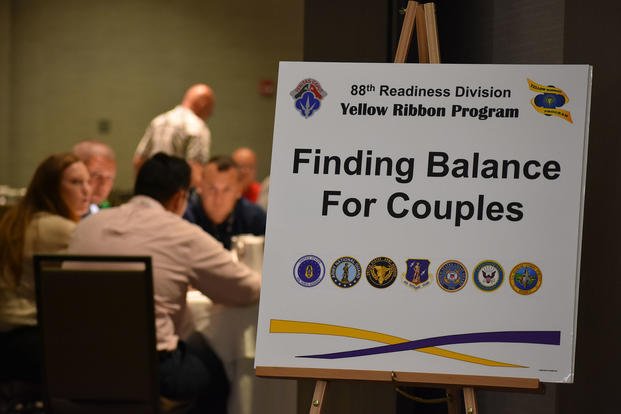Jennifer Barnhill is a columnist for Military.com writing about military families.
Kaitlin Erkkila's son was losing weight to the point of starvation. She went to the doctor 17 times seeking a referral to find an answer. Her husband returned from deployment and got the referral in one appointment. It was leukemia.
Two years later, his younger brother was diagnosed with a brain tumor.
While her husband was deployed, Kaitlin has wiped tears, including her own; learned medical terminology; and attended 258 medical appointments over the course of a year. She has gotten good at appearing resilient, and contrary to popular belief, that is a bad thing.
Military families are used to "making it work" and "embracing the suck." But as Americans become increasingly comfortable with embracing vulnerability, what happens when being resilient no longer serves you or your family? Or worse yet, what if it does more harm than good?
Unfortunately, resilience is not something that the military family community can opt out of. When situations are hard, they must get through it, get over it or move on. And it's not just adults who are expected to measure up against expected hardship. Gen. Mark Milley, chairman of the Joint Chiefs of Staff, and his wife, Hollyanne, visited Sesame Street in honor of April, the Month of the Military Child, praising the resiliency of military kids.
"No matter what challenges you face or what comes your way, you bounce back and always do your best," said Hollyanne.
Their intentions can't be faulted. Without a doubt, they want to recognize the hardships faced by military kids.
"No matter how high the mountain or how wide the river, all of our military kids are resilient enough to climb the mountain or cross the river," Gen. Milley remarked.
What wasn't said was, I will work my hardest to remove the mountain from your path and build bridges so you don't have to work so hard to keep your head above water. Military family programming exists to support families through the expected, but stops short of working to make achievable improvements. The Department of Defense expects military life to require resilience. It doesn't expect to have to make it suck less.
Erkkila learned that her resilience was being held against her during a phone call she received from a Military Treatment Facility (MTF) case manager. "You haven't been selected for my case list, but I had to give you a call," Erkkila was told. The case manager proceeded to recount her supervisor's reasoning:
"This is a mom, who came in and presented as clean, dressed, she's educated. She has a master's degree, and that is, she knows how to navigate this system. We have so many other mothers who need more help. She's gonna be fine. She doesn't need your services."
Limited resources are a reality within MTFs. Planned reductions of roughly 18,000 uniformed medical billets have concerned military families since 2019, and COVID-19 has exacerbated the military provider shortage. The Erkkila family knew there were not enough case managers to go around and so did administrators. Two children with cancer is a lot to handle for anyone, surely qualifying her as someone in need of assistance.
So she asked one of her children's doctors, "'If I came in pajamas with dirty hair and no makeup, looking exhausted, screaming for help, would you say that my kid wasn't OK? Or would you flag me as someone who needed help with caregiving who wasn't capable of doing what was necessary?' And she looked me dead in the face and goes, 'You know what, that's exactly what would happen.'"
Caseworkers saw their brave faces and labeled them resilient. Their family was left to navigate the medical, financial, educational and emotional impacts of childhood cancer -- times two -- alone. Erkkila abandoned the notion of working outside the home and became a full-time caregiver, routinely spending hours on the phone with medical providers and Tricare. She reported spending 58 hours resolving three bills that weren't coded properly. She was resilient in the face of her circumstances and felt punished for her efforts.
Routine Resilience
Childhood cancer is unusual, but routine resilience is a staple of military life. Active-duty service members are thrust into dangerous situations and forced to make life-and-death decisions regularly.
Facing those kinds of stressors, it makes sense that the military would focus on developing the essential skill of resilience. On the battlefield, resilience is life-saving. To see one's friend killed or wounded in action and still be able to carry on to safety is what our servicemen and women are trained to do.
On the homefront, however, it can be used as a weapon.
I first saw how expectations of resiliency weigh on service members in 2008 while living in Atsugi, Japan. My husband and I moved to the country just shy of our second wedding anniversary. We had a few weeks to settle in to the new culture, arrange housing, buy a "base beater" (read: car), make friends and attempt to find excitement before sending him on his first deployment aboard the USS Kitty Hawk.
He left before our household goods arrived, but after signing a lease and buying the car, something I was not legally entitled to do on my own. Spouses weren't granted many legal rights in Japan as a result of service-member-focused Status of Forces Agreements (SOFAs).
I made the best of the experience by making friends and exploring Japan, an admittedly easy task. This level of resilience was doable. Our spouses were quite literally in the same boat. We were far from family, in a country that can be difficult for outsiders to navigate, but we found distractions and "made it work." It highlighted the best of what a military community could be in the midst of difficulty.
But every once in a while, the white-picket-fence, surface-level perfection betrayed itself. Jobs were scarce. And even our own communities mirrored our service members' experiences, where taking care of one's own also involves not acknowledging negative experiences, to maintain morale.
The negativity that can be produced by a resiliency-focused culture bubbled over during an interaction with my close friend and fellow military spouse, Dawn Limmer, who discovered she had experienced a first-trimester miscarriage. She and her husband had been trying to get pregnant for years after having conceived their first child without difficulty. When she finally got pregnant, their family was ecstatic.
So when she lost the baby on Mother's Day, she was understandably devastated. Her husband was deployed, so she was processing much of this alone while caring for her 4-year-old daughter. She was given medicine to help her "resolve" the pregnancy and sent home to wait for the baby to pass. She did what we were all expected to do; she reached out to her community. While a few were supportive, many were more misguided:
"We've all been through that."
"Miscarriages are so common."
"You just have to pick yourself by the bootstraps and carry on."
Although these comments came from positive intentions, they felt like an accusation.
At a time she should have been processing her grief, she also worried about falling short of expectation, not behaving as a resilient military spouse would.
Ultimately she returned to the United States to see a civilian counselor to help work through the situation. "It was interesting because there was a difference. The civilian counselor said, 'It's OK; you can grieve,'" she recalled. Instead of being resilient, she needed to be allowed to sit with her sadness and to have her community allow her to grieve.
Resilience or Learned Helplessness?
There is a perception within the military family community that grief and negative emotions are contagious. We focus on positivity because we are afraid of what could happen if we let ourselves acknowledge the hardships. So we stiff-arm pain and rush through our negative emotions quickly to keep up morale so we can get through the deployment, move, fight, job loss, etc.
Military spouses carry a lot, serving as solo parents, reinventing our careers and developing new friendships with every move. Although we don't officially serve, our hidden service can have a steep cost. In 2019, the Department of Defense released its first-ever Annual Suicide Report, including suicides among military family members. Although suicide rates among the military spouse community are low, sustained resiliency asks military families to embrace the suck with no end in sight.
Science tells us that this type of sustained resilience is different than situational resilience. This is what psychologists call "learned helplessness." This idea was developed by Martin Seligman in the 1960s through a series of experiments. The experiment inflicted shocks on dogs. Some could escape the shock and some could not, and the results were telling. If we don't believe we can control our circumstances, we accept them even if there is a way to stop our pain. We are conditioned to "embrace the suck."
While military families' version of "embracing the suck" rarely involves shocks or actual physical pain featured in the experiment, we are training ourselves to let go of hope to avoid disappointment. If we can't control being separated from family during hardships, we will pretend we are strong, hoping we even fool ourselves. If we can't control a lack of opportunities within our career field in our new duty station, we settle for something less and start to resent the military or our spouse. Instead of trying to mitigate the negative aspects of military life by finding solutions to our very real problems, "embracing the suck" (read: resilience in sheep's clothing) asks us to accept our shocks, making true resilience less and less of an achievable reality.
Luckily families like the Erkkilas and Limmers have found their tribes, who allow them to sit with their sadness and frustration with the hardships of military life. But it is not enough to redact resilience from our own vocabularies. If the pressure is to be removed, our entire community needs to see resilience as a skill to be developed, not a label withheld from those who fail to or refuse to embrace the suck.













